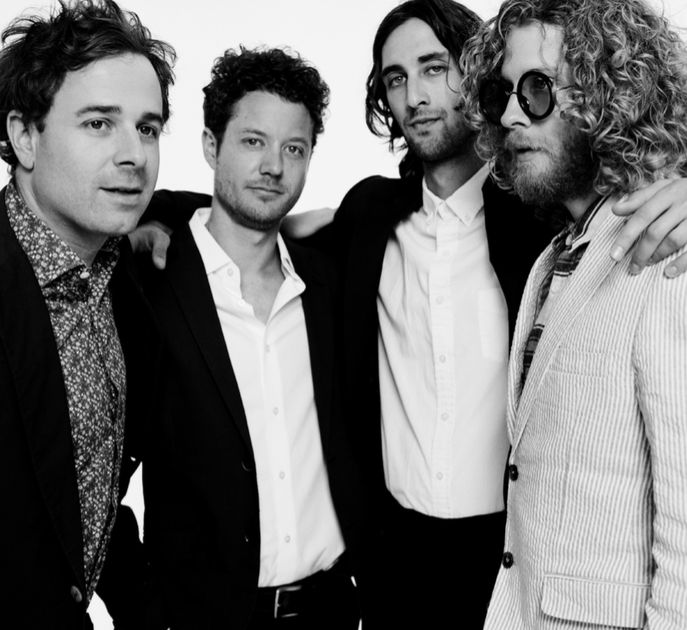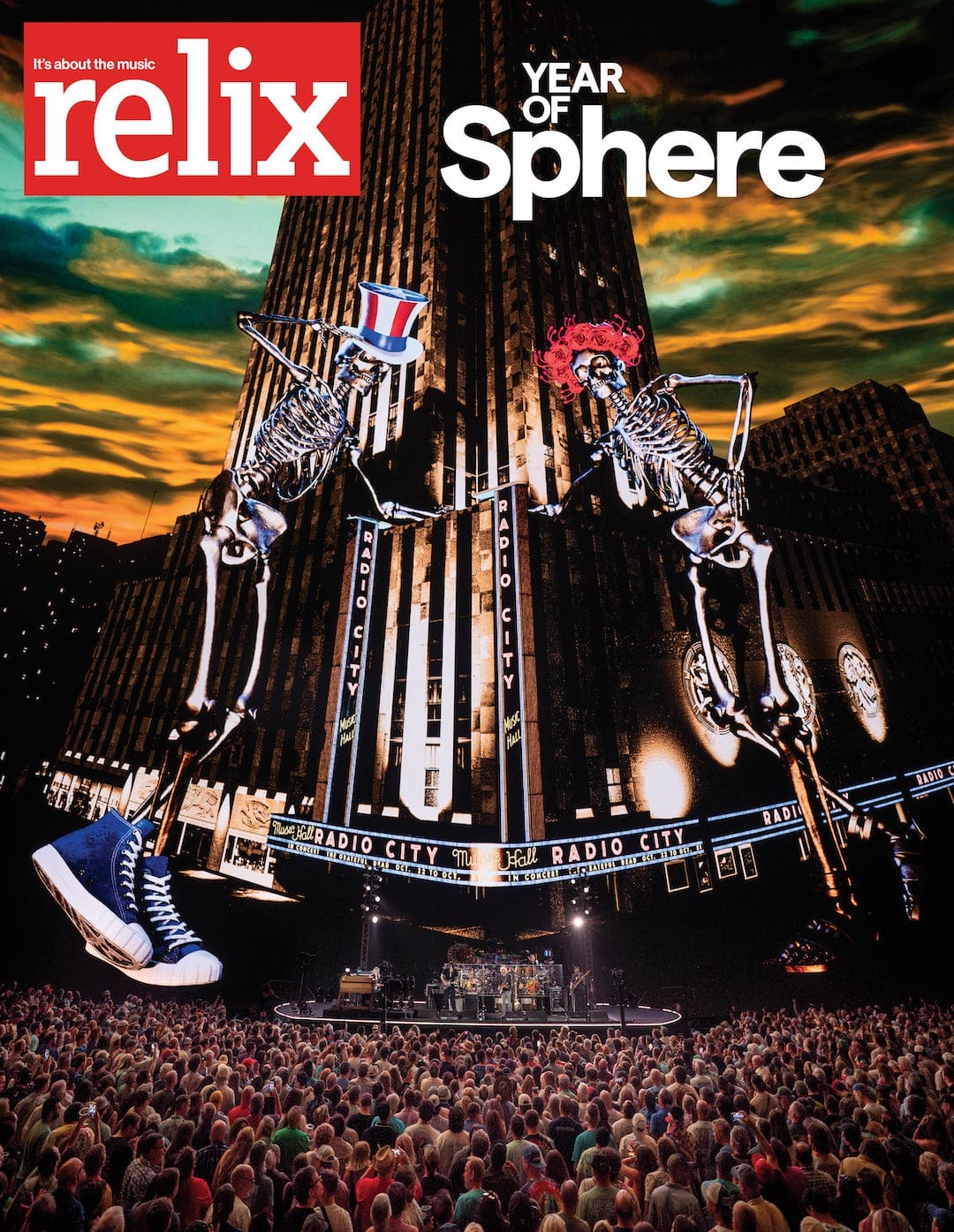Dawes: The Unexpected and the Inevitable

“Have you been here before?” the Los Angeles native asks enthusiastically. “There is a great spot out front.”
It’s a few minutes before noon on the last Friday of the summer. Charter buses are emptying gobs of chattering visitors who are not sure where to look first. An Asian tourist in a size-too-small sombrero smiles for a photo, the iconic Hollywood sign over his shoulder. Taylor finds a small table on the Observatory’s southern terrace and sits with his back to the snarled, sprawling matrix of the LA basin in the distance. The black-domed planetarium and its bleached- white edifice stand sentry to his right. It’s peaceful and oddly quiet this high up, and the stillness is surreal in contrast to the nearly four million souls rushing around the City of Angels below.
Energetic, if a bit bedraggled, Taylor is days removed from the road, just off a Dawes amphitheater run supporting Alabama Shakes. His almost-shaggy beard befits his folksman rep—or could perhaps belong to an NHL skater in a playoff push. It’s worth asking why mortality is now on the mind of the quartet he leads with brother Griffin on drums, bassist Wylie Gelber and keyboardist Lee Pardini.
“There’s a duality to it. I told some friends the title of this record is We’re All Gonna Die, and they said, ‘That’s amazing. That’s hilarious. You’ve got to do it,’” says Taylor, 31, the group’s primary songwriter, singer and guitarist. “On the other hand, I don’t want it to ever come off as some guy in his early 30s who thinks this is a joke. It’s as terrifying to me as it is to anyone, maybe even a little more.”
Dawes rose out of the ashes of Simon Dawes, a Malibu rock band that included guitarist and producer Blake Mills. Though homegrown in Southern California, Dawes stylistically took a left turn off the Pacific Coast Highway into the Laurel Canyon sound of the 1970s popularized by Neil Young and Joni Mitchell, quickly garnering the folk tag after the group’s first two albums and a subsequent high-profile pairing with Jackson Browne at a 2011 Occupy Wall Street event. They found their first success on the road, headlining clubs and theaters, turning festival stages like Newport Folk into second homes.
But soon after, Taylor found himself trying to break away.
“When we were making our early records, the idea of hearing my acoustic guitar back into my headphones felt like it could’ve lasted me forever. I was so in love with the most bare-bones approach to documenting songs,” he recalls. “It was never an intentional thing to chase down new stuff and make a 2016 record because I wouldn’t know how. For us, it was: ‘Let’s create something that confounds us.’”
We’re All Gonna Die is likely to be confounding to many, starting with the timing of its release. Since 2009, Dawes had established a reliable schedule of recording and touring, delivering four albums in six years. They made 2015’s All Your Favorite Bands in Nashville with esteemed Americana musician and producer Dave Rawlings, and welcomed some of Music Row’s most notable session players as guests. It bowed at No. 1 on the folk charts.
For the group, it marked a goal met, and a new expectation to shatter. “With All Your Favorite Bands, we had one clear objective: ‘Let’s put down what we know we can do—what we do on a nightly basis on our instruments and as singers,’” explains Taylor. “In a way, that opened up a whole new world for us. ‘What do we want to do now?’”
Only eight months into touring in support of the record, Dawes were back in the studio. There were enough strong song ideas rising to the surface that Dawes put their expected road schedule promoting All Your Favorite Bands aside without pause. “There’s a concern with making sure you milk an album for all it’s worth, in terms of touring,” Taylor says. “Really, I’d love to be putting out music every day.”
Enter Mills: Taylor’s old bandmate, best friend and one of the hottest producers of the moment with credits like John Legend, Alabama Shakes, Laura Marling and Jim James under his belt. Having recently been nominated for a Producer of the Year Grammy for his work on Alabama Shakes’ Sound & Color—the record would win Best Alternative Music Album—Mills was primed to take the Dawes everyone knew and ip it on its head. Dawes was ready, too, tapping into what Taylor refers to as Mills’ unquenchable ambition to make great albums.
“If we would’ve gone with another producer, one we’d worked with before, we could’ve made this batch of songs sound like an extension of Nothing Is Wrong or All Your Favorite Bands,” explains Taylor. “It wasn’t the material that forced us to make a different-sounding record. It was the fact that we wanted to.”
In March, Mills and the group set up at EastWest Studios on Hollywood’s Sunset Boulevard. From the outset, it was apparent he was the perfect partner to walk them to the precipice. Anything and everything would need an explanation in a process that Taylor describes as both incredibly thorough and illuminating.
“It’s challenging,” says Taylor. “Every lyric, he’s like, ‘Why are we doing this?’ Even something simple, like when I would repeat a line three times, he’d ask, ‘Why is it said three times? I need to understand why.’ All of a sudden there is this conversation that unearths new information, not only for him, but for me.”
However rewarding the sessions may have been for the band, the finished product may well be a jolt to the ears of longtime fans, a likelihood that Taylor anticipates and embraces. “If people say, ‘Dawes was this and I liked them, and now they’re not and I hate them,’ to me, that is exciting. I think that’s promising. What would be terrible is if people say Dawes delivered a really dependable Dawes record. Then, no one would care. It’s just going to go away.”
A few days later, with no signs of an imminent apocalypse, Griffin Goldsmith calls from his car. “We knew the substance of the album was going to be controversial for people that have liked our band in the past,” he says. “What I most enjoy about the title is that it forces you to face it, and it’s inevitably going to evoke hateful responses as well as favorable ones. It’s [coming] face to face with the fact that we each have a subjective experience.”
The record’s most obvious and immediate differences are derived from its sometimes deceptive sonic presentation. The instruments are percussive and spacious, doubling to accentuate punchy rhythms,
There is a conspicuous precision to it all, in particular in Griffin’s drumming. And a share of eccentricity, like Mills using a Pelican case as a stand- in for a kick drum or insisting that Griffin repeatedly strike a small marked spot to achieve the acoustic and emotional optimum.
“The effort was to take every note played on the drums during a song and do less,” Griffin says. “In turn, I would view each note with more soul, if you will. Make it more meaningful by doing less.”
Even, Griffin elaborates, by allowing him to emulate the tonal and regimented qualities of 808 and MPC drum programming machines on his kit—hallmarks of the hip-hop music he notes as an influence. Both Goldsmith brothers have enjoyed reading early reviews that have, incorrectly, cited the record’s unconventional instrumentation.
The drummer mentions one article, which reports, “‘The song opens up bare with fuzz guitar and a drum machine,’ neither of which is on that song, which I think is cool. I like listening to records where I can’t quite decipher what’s going on.”
“I wanted to figure out weird sounds. I wanted to figure out weird parts,” his brother adds. “I wanted to support something that instead has the spotlight on Wylie or on Lee or on Griff.”
In the past, the guitarist has recorded keyboard parts but, this time, he turned them over entirely to Pardini, the newest member of Dawes. Pardini joined the ensemble last year, initially as a tour replacement for Tay Strathairn, and immediately made distinctive contributions to the outfit.
“Let me just get out of the way,” Taylor says of deferring to Pardini. “He’s so prolific and in a lot of ways, was like the MVP.” A steady stream of guests flow through the record too, including venerable drummer Jim Keltner, Will Oldham and Jim James; Keltner’s contribution, a beautifully atonal MPC percussion track on “When the Tequila Runs Out,” moved Griffin to call him a genius. As for the female voices, there is Alabama Shakes frontwoman Brittany Howard, Lucius’ Holly Laessig and Jess Wolfe, and one other person, who’s perhaps the single biggest reason Taylor is feeling so full of heady thoughts.
“If someone is asking, ‘Do you love your girlfriend Mandy?’ Hell, yeah, and I’m proud of it,” declares Taylor.
Mandy is singer and actress Mandy Moore, who reportedly finalized her divorce from musician Ryan Adams in June. She and Taylor have been dating and, for him, the inclusion of her on the album is as much about his personal joy as it is her professional acumen.
“She happens to be an amazing singer,” Taylor says.“I wouldn’t know what it means to try and hide a relationship but, at the same time, I wouldn’t want to exploit it.”
Taylor does admit to his initial concerns that any burgeoning romance could adversely affect his craft.
“I was forcing myself into a certain lifestyle of constantly being alone for fear that [love] would take away my ability to write,” he says. “With Mandy, I’ve never been happier. I’ve never been more productive. I’ve never made two albums in two years. So, all those concerns were childish and embarrassing.”
His brother and his band see the changes as well. “It’s more evident now because of his relationship and where he’s at,” says Griffin. He also shared the load.
Of the 10 songs, Mills co-wrote six, with Taylor and friend Jason Boesel collaborating on a pair. Where previous records were outlets to indulge darker, more personal themes, the relationship with Moore brings an inner cheerfulness to We’re All Gonna Die.
For Taylor, it makes perfect sense.
“Making this record, singing these songs—it feels like a celebration,” he says. “There’s more of a smile on this record’s face than others before.”
A week later, the band throws a record-release party for family, friends and lucky fans, fittingly, at the Hollywood Forever Cemetery. Inside the Masonic Lodge, Dawes, with new touring guitarist Trevor Menear and Moore as a guest vocalist, debut the new material as millennials sway to the trance of the title track. Outside, a full moon hovers over Rudolph Valentino and Alfalfa from The Little Rascals resting in peace, the duality of celebration and smiles in the shadow of the once famous, who are forgotten a little more each day.
At the Observatory, Taylor looks out over the city. He talks about persisting motivation and doubt—the drive of the musician—name-checking the local venues that measure success in upward progression. We are all going to die, but that never stops the dreamers or the dreams.
“The guy that has never played a show in his life looks at the guy at The Echo and says, ‘If only I could do what he does.’ And the guy at The Echo goes to the Greek Theatre and says, ‘If only I could do what



















